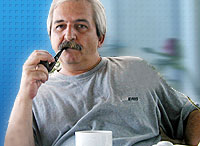On the phone, Felicity Staples was listening to a district attorney tell her she was making a mistake. He was hard to hear, because of the clock. “What you’re insinuating simply isn’t correct,” said the D.A. He was the county D.A.; his name was Tom Daniels. He and Felicity had spoken several times before, and each time, his opinion of her seemed to drop a little more.
“I’m not insinuating anything,” she said. “I’m only asking questions.”
“Please.” She’d seen him do this on TV, when pressed on something he didn’t want to answer: Please, then a subtle change of subject. A pinch of the brow, expressing both amusement and pain at the question. Daniels was mid-forties, somewhat dubiously tanned, with a magnificently expressive face. “How long have you spent on this story? I have trouble believing that Brandon considers this a sensible use of your time.”
Brandon Aberman was the paper’s managing editor. She ignored the jibe, because, one, it was a diversion, and, two, yes, Brandon would definitely prefer her to work on something else, preferably involving bedbugs.
“A young man from a well-connected family walks away with no time served despite a plethora of evidence—”
“Plethora,” said Daniels. “I’m so glad you’ve found an outlet for the English degree. If you were more familiar with the reality of prosecution, you’d understand we have to make the best deal we can, given the circumstances.”
“Circumstances like the family mixes socially with the mayor?”
“Felicity Staples,” he said, like a disappointed parent. Felicity Staples, come here. Did you make this mess? “I’m quite sure there’s a better outlet for your talents than fishing for gotcha quotes from a D.A.”
The newsroom was a huge open space with dark desks jumbled about beneath silent, hyperactive TV screens. Felicity’s desk was near the front, close to the elevators, beneath the clock. Blind-shuttered glass offices lay to her left and right, while ahead, beyond a barren patch of deskscape that had lain bare for six months, were two glorious windows, offering skyscraper-framed glimpses of sky. In between was a message board, where stood Melinda Gaines, a political reporter and columnist, with a coffee cup. Melinda raised the cup and took a careful sip. On the message board, Felicity knew, was an internal job posting for “social media manager.” She knew that because she’d studied it herself a few times already. Each time, she’d decided the position was irrelevant to everything she’d ever studied for, worked toward, and believed in, as well as offering less money. But it was also a job that would definitely exist in twelve months, which couldn’t be said for her own. Watching Melinda Gaines contemplate it over coffee was terrifying, because Melinda Gaines was forty-four and had written a towering series of articles exposing three corrupt city judges. If Gaines was considering “social media manager,” the writing really was on the wall for the future of journalism. Literally posted there.
“I’m comfortable with how I’m employing my talents, thank you, Tom,” Felicity said, because she didn’t want to verbally spar with Tom Daniels. She wanted to make him feel comfortable and eviscerate him in print. She was thirty-three. She could do plenty of things with her life. “Is it true that you met with the Hammonds personally the night before you dropped the charges?”
“I’d have to check my diary.”
Her view of Melinda Gaines contemplating the future of journalism was broken by the gangling form of Todd the intern, flapping a piece of yellow notepaper. He wore round glasses and an anxious expression. “I’ve got a murder.”
Felicity shooed him. She did not do murders. She did city politics, lifestyle, occasionally stories on people who died eating something they shouldn’t have, but not murders. “You’ve met them, though, at some point? Socially?”
“I can find out and send you that information, if you like.”
He would not. He’d taken her call, to rob her of the line District Attorney Tom Daniels did not respond to requests for comment by the time this article was published; now he would string her along until the next revolution of the news cycle, when nobody remembered the curiously lenient plea deal of James Hammond, a fine-looking college boy whose promising future was briefly threatened by an assault upon a girl who laughed at him at a party.
“Can you take a murder?” said Todd, moving into her eyeline.








